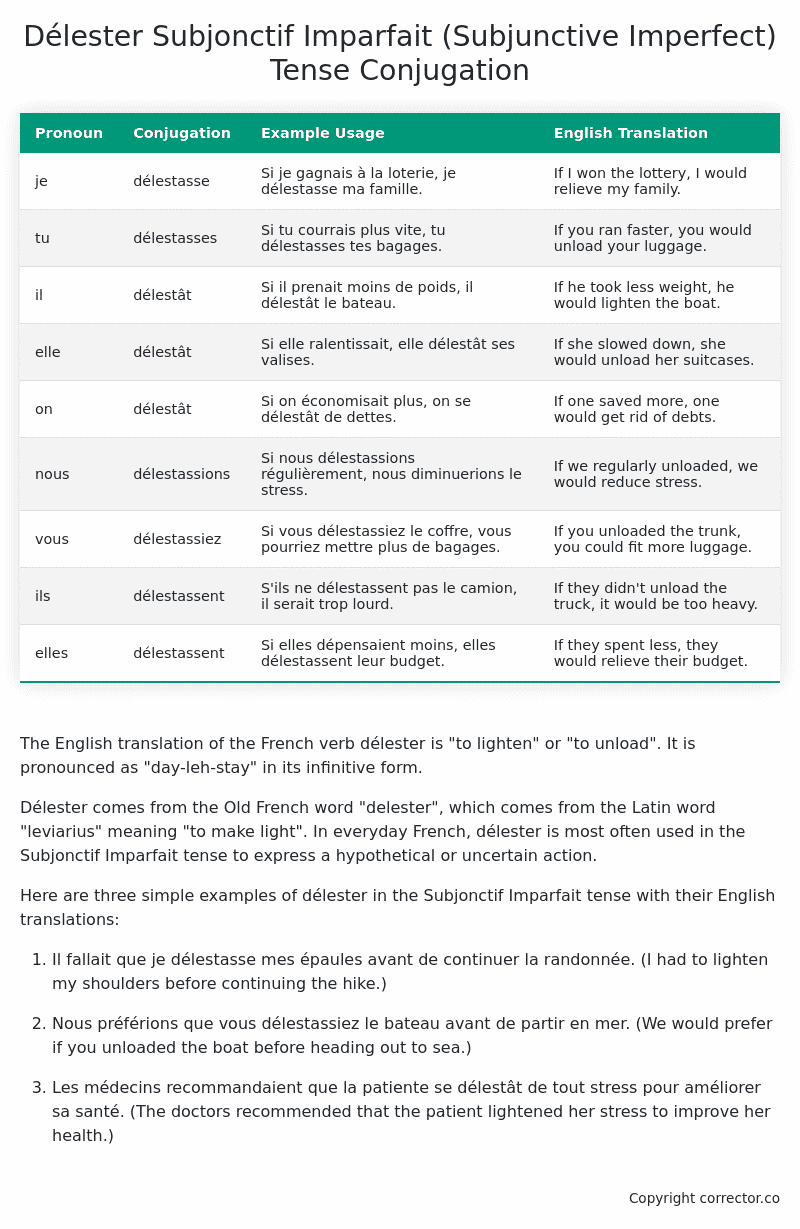Subjonctif Imparfait (Subjunctive Imperfect) Tense Conjugation of the French Verb délester
Introduction to the verb délester
The English translation of the French verb délester is “to lighten” or “to unload”. It is pronounced as “day-leh-stay” in its infinitive form.
Délester comes from the Old French word “delester”, which comes from the Latin word “leviarius” meaning “to make light”. In everyday French, délester is most often used in the Subjonctif Imparfait tense to express a hypothetical or uncertain action.
Here are three simple examples of délester in the Subjonctif Imparfait tense with their English translations:
-
Il fallait que je délestasse mes épaules avant de continuer la randonnée. (I had to lighten my shoulders before continuing the hike.)
-
Nous préférions que vous délestassiez le bateau avant de partir en mer. (We would prefer if you unloaded the boat before heading out to sea.)
-
Les médecins recommandaient que la patiente se délestât de tout stress pour améliorer sa santé. (The doctors recommended that the patient lightened her stress to improve her health.)
Table of the Subjonctif Imparfait (Subjunctive Imperfect) Tense Conjugation of délester
| Pronoun | Conjugation | Example Usage | English Translation |
|---|---|---|---|
| je | délestasse | Si je gagnais à la loterie, je délestasse ma famille. | If I won the lottery, I would relieve my family. |
| tu | délestasses | Si tu courrais plus vite, tu délestasses tes bagages. | If you ran faster, you would unload your luggage. |
| il | délestât | Si il prenait moins de poids, il délestât le bateau. | If he took less weight, he would lighten the boat. |
| elle | délestât | Si elle ralentissait, elle délestât ses valises. | If she slowed down, she would unload her suitcases. |
| on | délestât | Si on économisait plus, on se délestât de dettes. | If one saved more, one would get rid of debts. |
| nous | délestassions | Si nous délestassions régulièrement, nous diminuerions le stress. | If we regularly unloaded, we would reduce stress. |
| vous | délestassiez | Si vous délestassiez le coffre, vous pourriez mettre plus de bagages. | If you unloaded the trunk, you could fit more luggage. |
| ils | délestassent | S’ils ne délestassent pas le camion, il serait trop lourd. | If they didn’t unload the truck, it would be too heavy. |
| elles | délestassent | Si elles dépensaient moins, elles délestassent leur budget. | If they spent less, they would relieve their budget. |
Other Conjugations for Délester.
Le Present (Present Tense) Conjugation of the French Verb délester
Imparfait (Imperfect) Tense Conjugation of the French Verb délester
Passé Simple (Simple Past) Tense Conjugation of the French Verb délester
Passé Composé (Present Perfect) Tense Conjugation of the French Verb délester
Futur Simple (Simple Future) Tense Conjugation of the French Verb délester
Futur Proche (Near Future) Tense Conjugation of the French Verb délester
Plus-que-parfait (Pluperfect) Tense Conjugation of the French Verb délester
Passé Antérieur (Past Anterior) Tense Conjugation of the French Verb délester
Futur Antérieur (Future Anterior) Tense Conjugation of the French Verb délester
Subjonctif Présent (Subjunctive Present) Tense Conjugation of the French Verb délester
Subjonctif Passé (Subjunctive Past) Tense Conjugation of the French Verb délester
Subjonctif Imparfait (Subjunctive Imperfect) Tense Conjugation of the French Verb délester (this article)
Subjonctif Plus-que-parfait (Subjunctive Pluperfect) Tense Conjugation of the French Verb délester
Conditionnel Présent (Conditional Present) Tense Conjugation of the French Verb délester
Conditionnel Passé (Conditional Past) Tense Conjugation of the French Verb délester
L’impératif Présent (Imperative Present) Tense Conjugation of the French Verb délester
L’infinitif Présent (Infinitive Present) Tense Conjugation of the French Verb délester
Struggling with French verbs or the language in general? Why not use our free French Grammar Checker – no registration required!
Get a FREE Download Study Sheet of this Conjugation 🔥
Simply right click the image below, click “save image” and get your free reference for the délester Subjonctif Imparfait tense conjugation!

Délester – About the French Subjonctif Imparfait (Subjunctive Imperfect) Tense
Formation
Common Everyday Usage Patterns
Interactions with Other Tenses
Subjonctif Présent
Indicatif Passé Composé
Conditional
Conditional Perfect
Summary
I hope you enjoyed this article on the verb délester. Still in a learning mood? Check out another TOTALLY random French verb conjugation!


